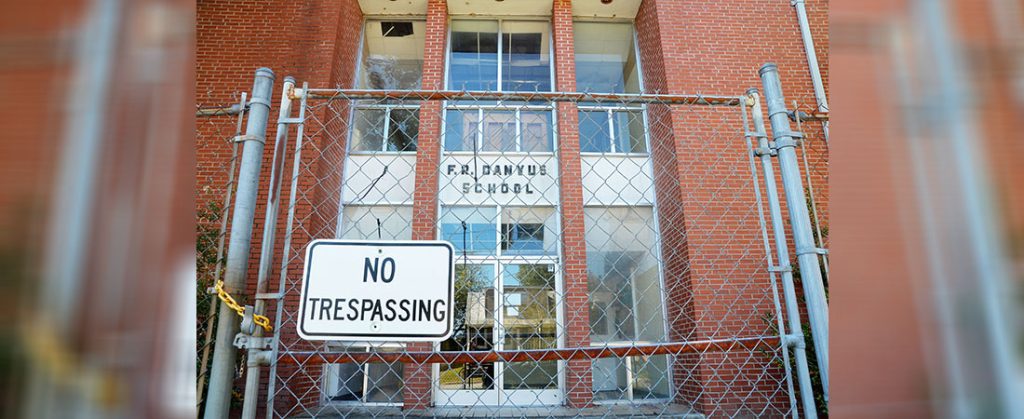
The Craven County Board of Commissioners have declined an offer from the county Board of Education to purchase the former F.R. Danyus Elementary School, a historic New Bern site that played an important role in the education of Black students in the area.
During their November 20 meeting, commissioners voted six to one to turn down an offer extended by the board of education to purchase the property located at 700 West Street in New Bern at fair market value.
The motion approved by the board stipulates that commissioners will send a letter to the BOE stating that they “recognize the historical significance of the property and that they encourage the Board of Education to look at every option to preserve it.”
Last month the BOE voted to declare the former site of F.R. Danyus Elementary School as surplus property that is “unnecessary or undesirable for public school purposes.” The resolution states that should the BOC choose not to purchase the property it can be disposed of by the school board by methods “including, but not limited to the negotiated sale and upset bid process,” as authorized by Article 12 of N.C. General Statute Chapter 160A.
During a discussion of the offer at Monday’s meeting, County Manager Jack Veit said he and county staff had viewed the building and found that the county currently has no use for the property, which he said is in poor condition and in need of major repair work. He noted the property “doesn’t provide any strategic cohesion with what we have downtown and what we’re trying to do here with the county complex,” in light of the county’s purchase a year ago of the waterfront property owned by the Sudan Shriners for $6 million.
“We have no need for property particularly in this condition at this point. We have just taken a large undertaking with the Sudan property here on site that we plan on moving forward with over the next few years,” Veit said.
While the Craven County GIS map has the 2.3-acre F.R. Danyus property valued at $82,250, Veit said he believed that may be high based on the condition of the building.
“But there may be some value to it to someone else from a development standpoint,” Veit commented.
The property’s history as an educational site dates back to 1870, when a small wood-framed building known as the Red Schoolhouse opened there to serve Black students, according to information from the New Bern Historical Society. The name was changed to the West Street Graded School before fire destroyed the structure in 1905. It was replaced by a two-story brick building that became the first brick graded school erected for Black students in the state. After the death of Principal John T. Barber in 1945, West Street’s high school department was moved to a new location on Cobb Street, J.T. Barber High School, which now serves as the site of J.T. Barber Elementary.
Barber was succeeded at West Street by Frederick R. Danyus and new buildings and a high school department were added in the 1920s.
Fire destroyed the historic brick structure in 1969 and new classrooms, an office, and a library complex opened on the site in 1971.
Throughout the 1980s the school served New Bern’s fifth grade students. F.R. Danyus Elementary closed its doors permanently on June 30, 1991, according to information provided by Jennifer Wagner, director of public relations for Craven County Schools. The site was most recently used as a Coastal Community Action, Inc. Head Start Center but currently sits empty.
Commissioner Beatrice Smith, the lone no vote on the motion to turn down the BOE’s offer to purchase the property, spoke about the importance of the school to both local Black history and New Bern history in general.
“It is one of the few Black markers that is left, and we need to recognize and remember our history, remember where we’ve come from, how far we’ve come and what we need to do and where to go,” Smith noted.
Smith said she felt the matter required further study and that an effort should be made to save the property.
“Although it’s a Black school it’s part of Craven County history, part of New Bern’s history and it’s worth saving, it’s worth remembering,” she commented.
Commissioners ET Mitchell and Chadwick Howard said they sympathized with Smith’s remarks. Mitchell agreed that the property is of historical significance and suggested the county consider reaching out to the state Division of Historical Resources.
“I think this is a site that might merit a historical marker because of its significance to the African American community here in Eastern North Carolina,” she said. “People here may know the significance of this building but people who are new to this community may not, and a historical marker, which I believe North Carolina government could help with, might be able to preserve that historical significance moving forward.”
Howard noted that “we do have a troubled history in this part of the state of tearing down significant Black history markers.”
“I don’t know what we could do about that but it does give me concern,” he said.
By Todd Wetherington, co-editor. Send an email with questions or comments.

